A modern Softphone powered by WebRTC.
Siperb is a Softphone for Asterisk, FreeSWITCH or any SIP/VOIP PBX. We provide both the Softphone and WebRTC-to-SIP Proxy to enable WebRTC calling on your existing PBX. Your PBX may not be WebRTC ready, or it may be, but you lack the Browser Phone required to make use of WebRTC, or you may just want more of the features that Siperb offers. Either way, Siperb can provide this for you.
What is Siperb?
Siperb is both the Softphone and the WebRTC-to-SIP Proxy.
Siperb provides both the Softphone (or Browser Phone) and the WebRTC-to-SIP Proxy that sits in the cloud between your existing PBX and your users. Use your existing PBX to seamlessly integrate with the advanced WebRTC capabilities we provide. At Siperb, we act as a proxy, bridging your current systems to our robust WebRTC client. This gives you the flexibility to connect with us directly or continue independently if your PBX is fully WebRTC-capable. Choose the path that best suits your infrastructure needs. Learn more about Siperb
- Supports SIP Over WebRTC:
- Our WebRTC client supports both Asterisk PBX and FreeSWITCH PBX.
- Web, Mobile & Desktop Client:
- Our Softphone client runs as a Web, Mobile or Desktop application in Windows, Mac or Linux - including Android and iOS.
- End-to-end Encrypted:
- We can act as a proxy, ensuring WebRTC calls are end-to-end encrypted.
- Three Ways to Connect with Us:
- We provide inbound and outbound registrations, and even offer register-less connections.
- Auto-Provisioned WebRTC:
- Forget about passwords - WebRTC details are automatically provisioned.
- Media Transcoding:
- If selected, call media can be transcoded to suit your PBX configuration.
Softphone Features
Our Softphone is free and packed with features designed for enterprise use. It's available as a web/desktop application and as a native mobile app for Android and iOS. Some features are still being worked on, see our development timeline.
- Call Recording (Audio & Video).
- Our Softphone supports call recording for both audio and video calls. Recordings can be stored locally or in the cloud, and are easily accessible for playback and download.
- Call Transfer (Blind and Attended).
- Our Softphone supports both blind and attended call transfer. Users can easily transfer calls to other extensions or external numbers with just a few clicks.
- 3 Way Call Conference.
- Our Softphone supports client side 3-way call conferencing. Users can easily add additional participants to an existing call without any server configuration.
SIP Proxy Features
Our Proxy sits at the heart of our service. Each Softphone Device automatically connects to this proxy with a unique SIP registration. Some features are still being worked on, see our development timeline.
- SIP-based WebRTC Proxy.
- Our SIP Proxy enables interoperability between modern browsers and legacy PBX systems, handling protocol translation, NAT traversal, and media negotiation to ensure reliable, secure, and high-quality voice and video calls.
- Mobile & Web Push Notifications.
- Our SIP Proxy supports mobile and web push notifications, ensuring users are able to receive calls at any time, on any device.
- DTLS to RTP transcoding.
- Our SIP Proxy supports DTLS to RTP transcoding, enabling secure media transmission for WebRTC calls while maintaining compatibility with legacy SIP endpoints.
Admin Control Panel
Our Admin Control Panel is designed to provide you with complete control over your Softphone and SIP Proxy. It allows you to manage users, devices, and settings with ease. Some features are still being worked on, see our development timeline.
- WebRTC Device Provisioning.
- All the important information like SIP details, settings, and even authentication details are automatically provisioned.
- Device Management.
- Configure device settings, and view device history including SIP trace and Registration Log Data.
- Connection Management.
- Connections are the SIP endpoints that connect us to you. Like normal SIP registrations, we provide various ways to configure connections so you can always make and receive your calls.
Register directly or use Connections
If you are fully ready with WebRTC, and just want to make use of some of the many features of Siperb, you are welcome to use the Socket Registration Mode. With this option, your own server details are entered into the system and provisioned to the client endpoint. This makes the WebRTC connection directly between the client endpoint (UAC) and your server (UAS). Media is also end-to-end encrypted and does not pass through us. This does, however, mean that some features like Push Notifications will not work.
Socket Registration Mode
Socket Registration Mode is when you register directly with your own PBX. We then only act as the Softphone provider, management, storage and provisioning service. Some features like push notifications cannot work in this mode, but most of the other features work fine.
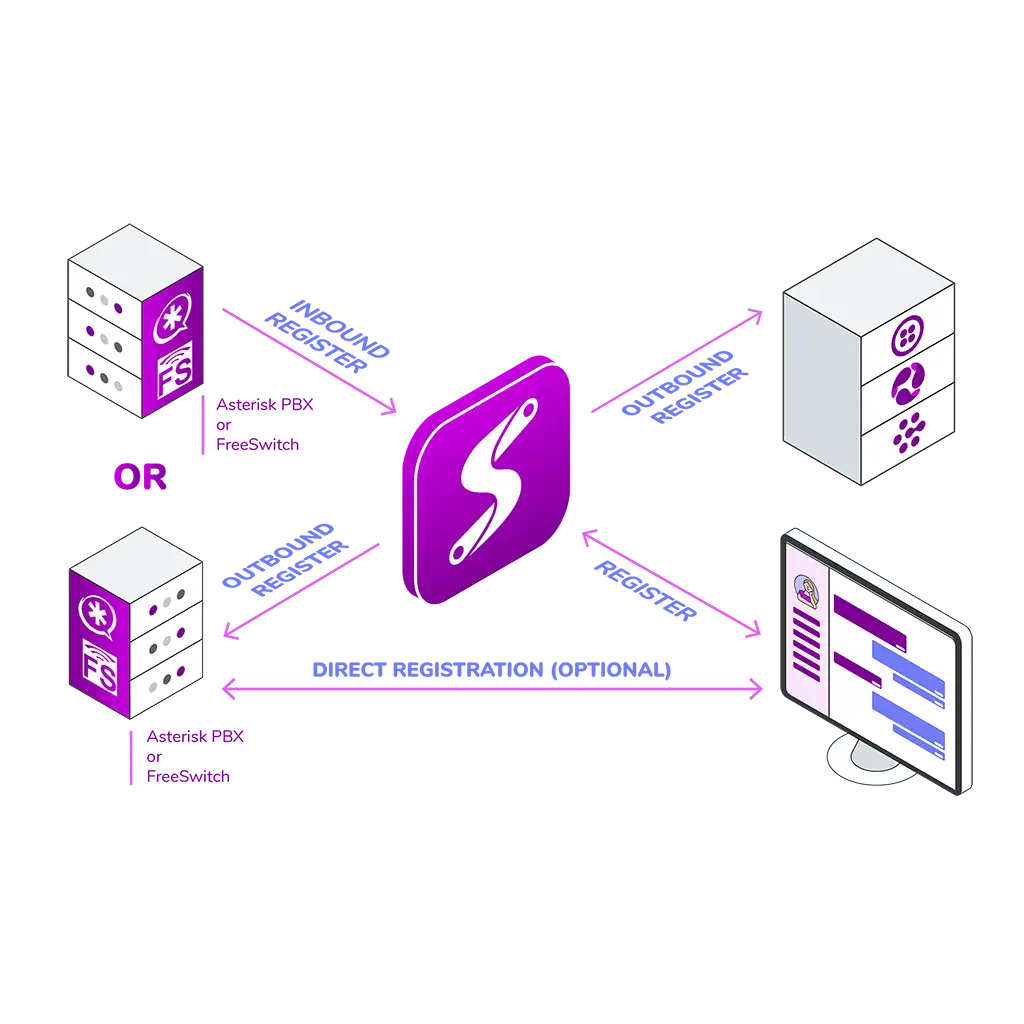
Proxy Registration Mode with Passthrough
Proxy Registration Mode is the default, where the Softphone automatically registers with us - in the cloud. You then setup "connections" to your own PBX or even directly with an ISP. These connections are very powerful, acting like UDP SIP trunks, or UDP SIP gateways. If your PBX or service provider supports ICE, SRTP/DTLS, then you can skip a media hop, and transmit media directly from us to you.
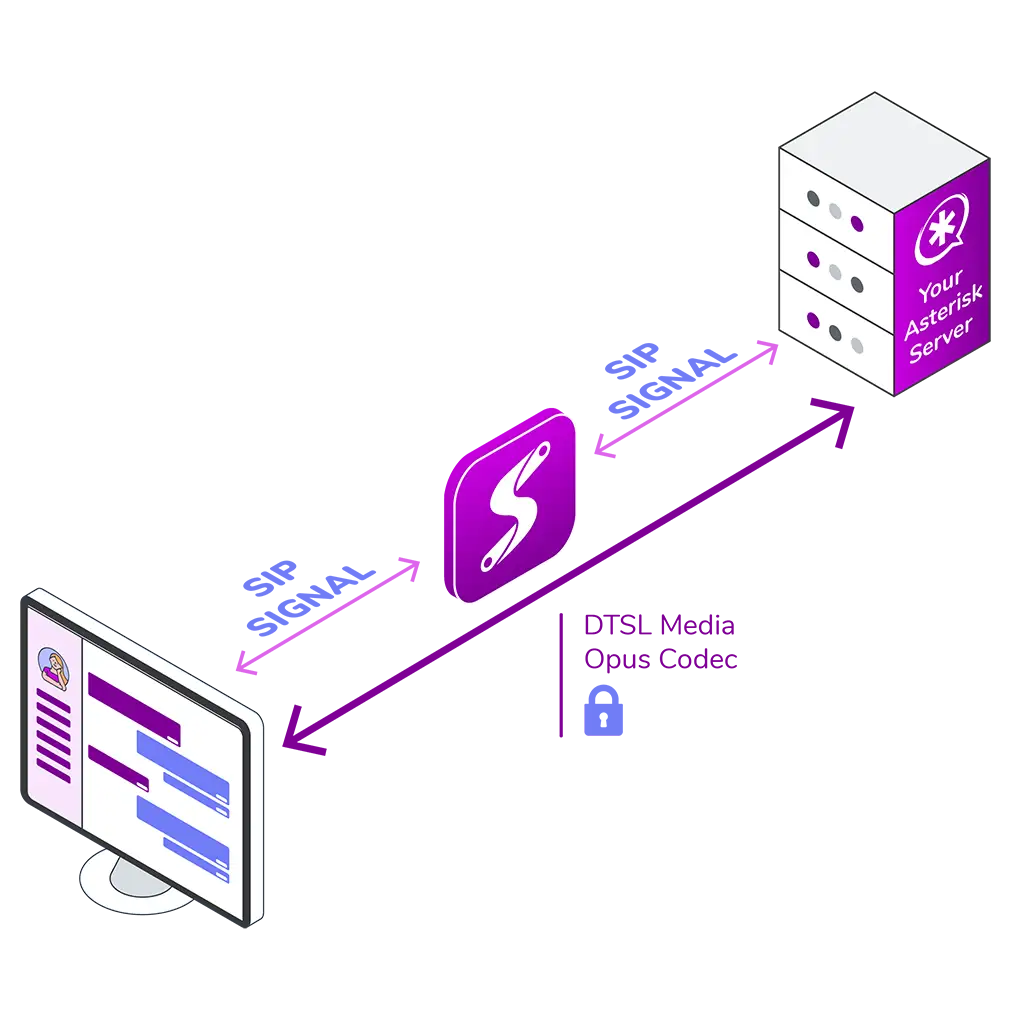
Proxy Registration Mode with Transcoding
Transcoding is another powerful "Business Pro" feature that allows you to use a legacy PBX without SRTP/DTLS. Media is transmitted via a transcoding server, hosted by us, and various low-latency points around the globe. Media is transcoded from the standard WebRTC format, with Opus codec encrypted as SRTP/DTLS, to G711 with no encryption (RTP).
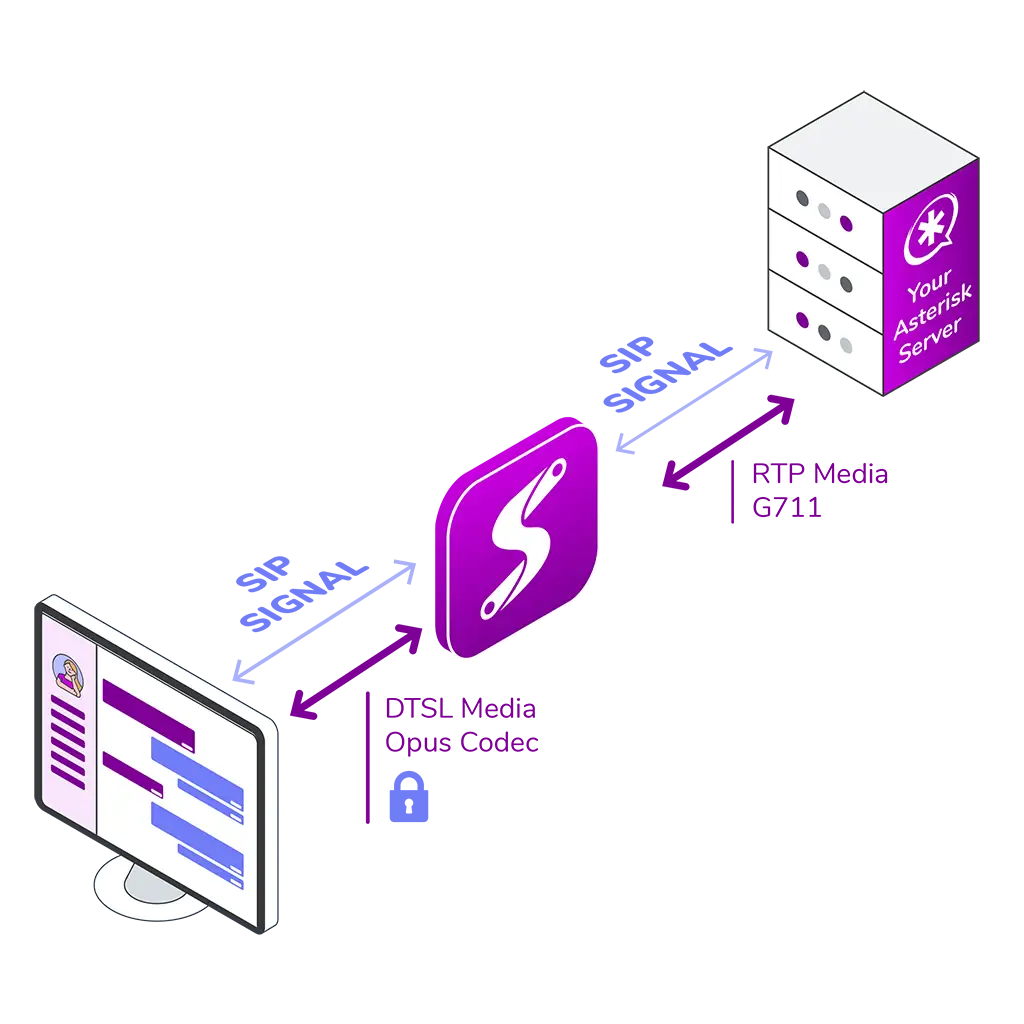
Socket Registration Mode
Socket Registration Mode is when you register directly with your own PBX. We then only act as the Softphone provider, management, storage and provisioning service. Some features like push notifications cannot work in this mode, but most of the other features work fine.
Proxy Registration Mode with Passthrough
Proxy Registration Mode is the default, where the Softphone automatically registers with us - in the cloud. You then setup "connections" to your own PBX or even directly with an ISP. These connections are very powerful, acting like UDP SIP trunks, or UDP SIP gateways. If your PBX or service provider supports ICE, SRTP/DTLS, then you can skip a media hop, and transmit media directly from us to you.
Proxy Registration Mode with Transcoding
Transcoding is another powerful "Business Pro" feature that allows you to use a legacy PBX without SRTP/DTLS. Media is transmitted via a transcoding server, hosted by us, and various low-latency points around the globe. Media is transcoded from the standard WebRTC format, with Opus codec encrypted as SRTP/DTLS, to G711 with no encryption (RTP).



A mobile-first approach
Communicate anywhere
Our mobile app is designed to keep you connected with your audience, no matter where you are. With a user-friendly interface and powerful features, you can manage your communications on the go.
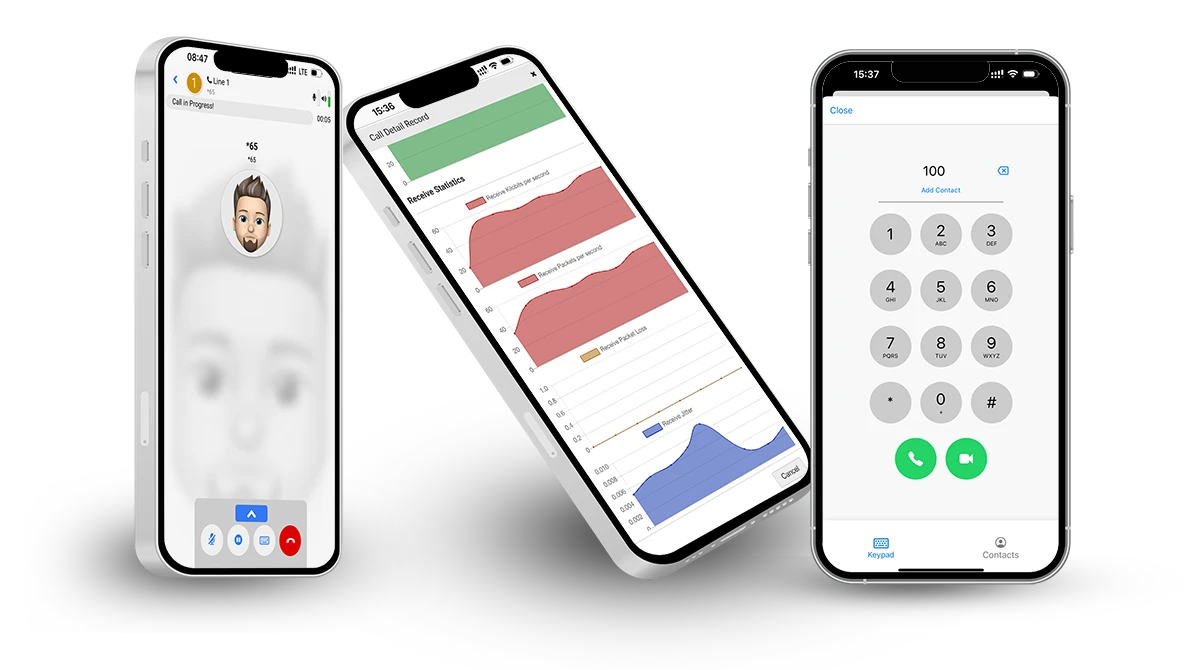
- Push Notifications.
- Mobile operating systems restrict background activity, so Siperb uses push notifications to alert you of incoming calls.
- Contact Integration.
- Most users already have their contacts stored in their phone, so Siperb securely integrates with your phone's contact list.
- Local Storage and Sync.
- All your data — including call history, messages, and recordings—can be accessed locally or seamlessly synced across your devices, so you never miss a thing.
- Audio Device Handling.
- Our mobile app supports Bluetooth and wired audio devices, allowing you to take calls hands-free or with your preferred audio setup.
- Network monitoring.
- Mobile applications can be sensitive to network changes, so Siperb monitors your network connection, seamlessly handing over from WiFi to mobile.
- Awesome User Interface.
- Siperb provides a consistent experience across all platforms with a modern user interface, designed for ease of use and customizations on any device.
Super fast deployments
Softphone Web Application
The Web Application can launch and run just like any regular application making it work well for Windows and MacOS. Siperb also runs perfectly fine in all major browsers, for example Chrome, Edge, Firefox, Safari. Just like the mobile applications can make use of native push notifications, the Web Application also supports push notifications, allowing you to be notified of incoming calls when the tab is closed, or even when the entire browser is closed. Browse Screenshots
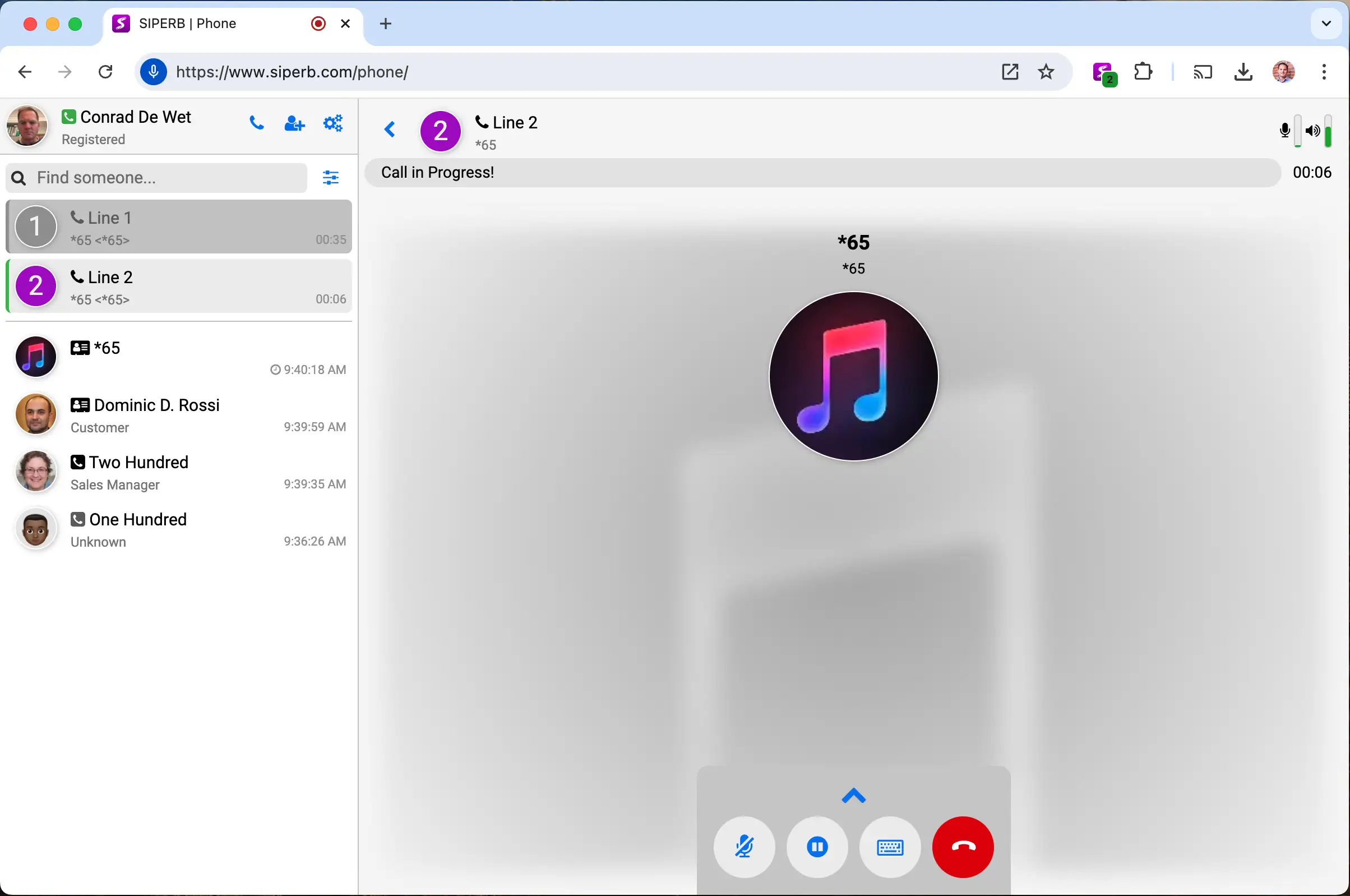
Call Performance
Multiple Calls
Siperb allows you to handle multiple calls seamlessly, ensuring a smooth experience for users.
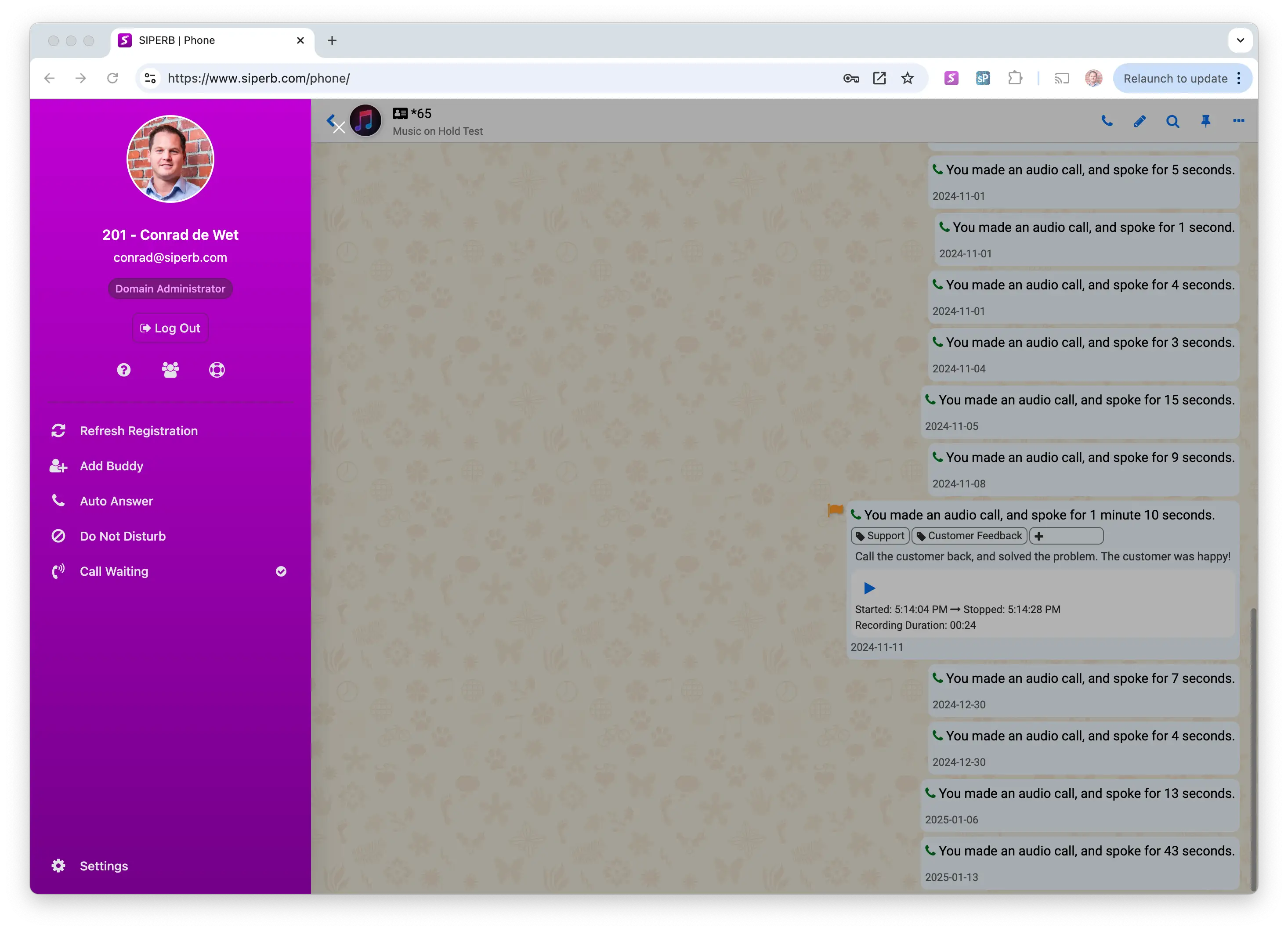
Privacy
Easy Presence Management
Siperb ensures that your presence is managed effortlessly, allowing you to focus on what matters most.
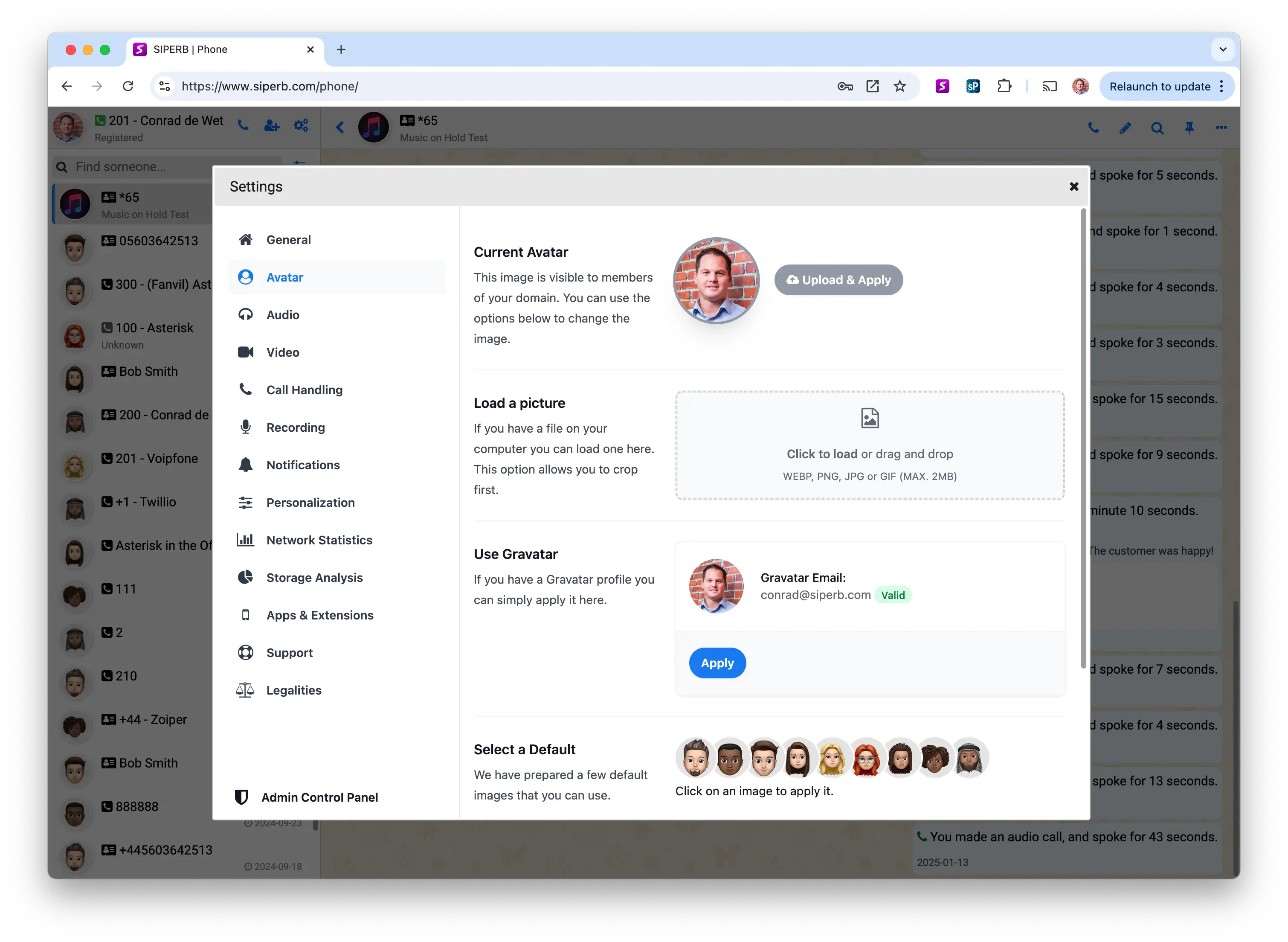
Settings
Personalize
Upload an Avatar, set your status, and manage your profile with ease.
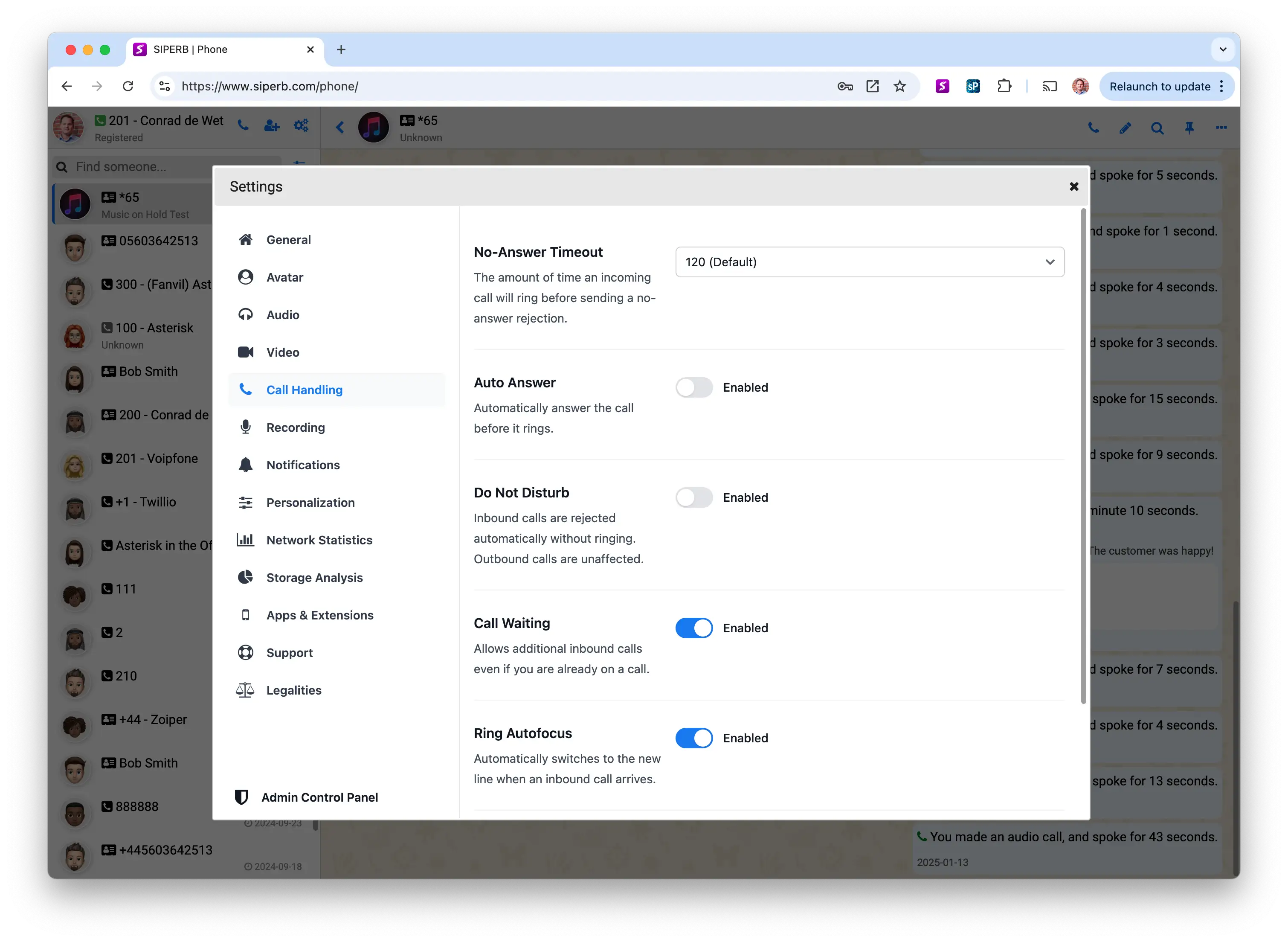
Settings
Call Handling
Manage incoming calls, and customize your call handling preferences.
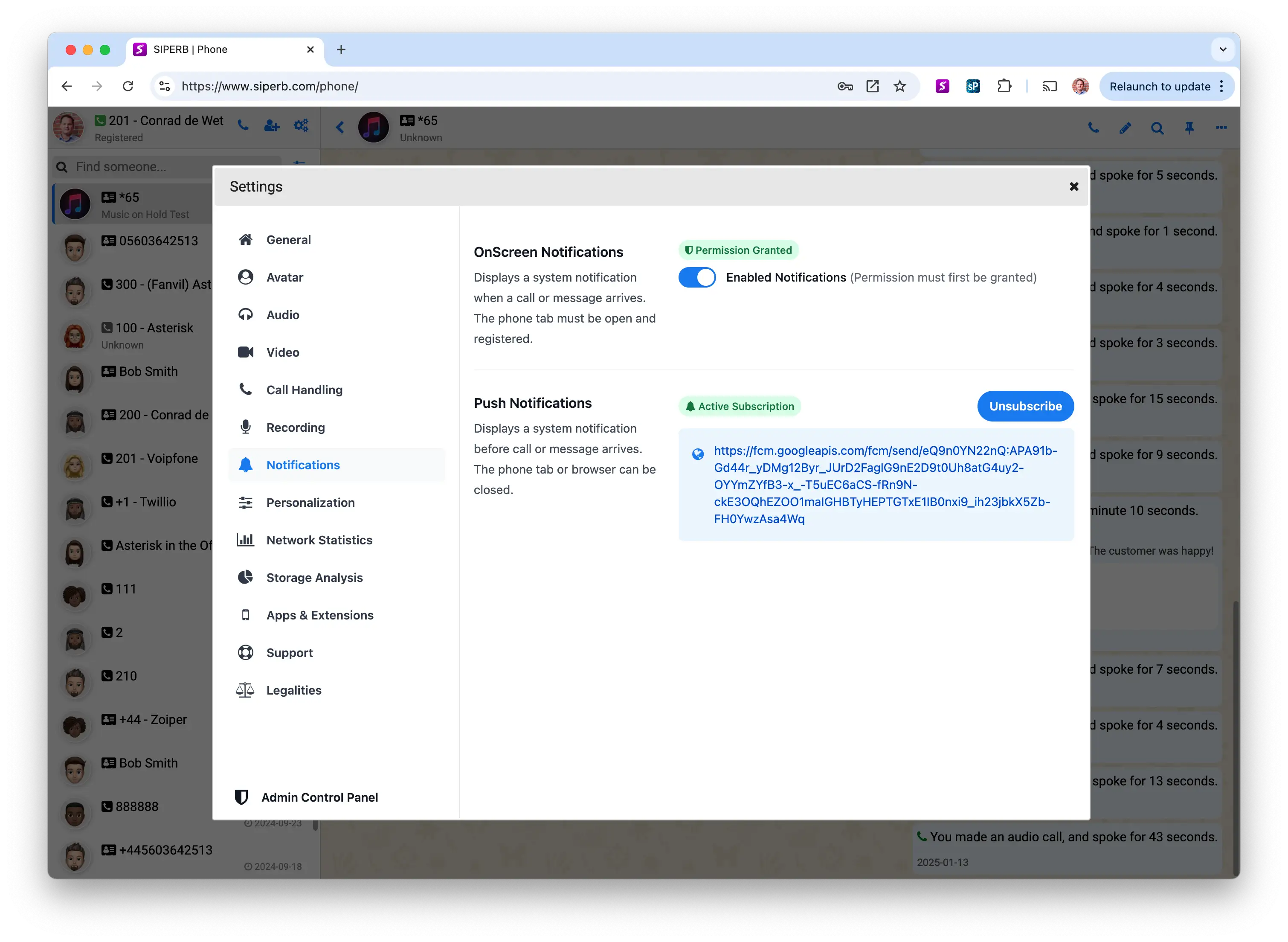
Settings
Web Push Notifications
Get that important call with push notifications, even when the tab is closed.
Frequently asked questions
We often get the following questions. There are a few more Frequently asked questions, but if you have any other questions, please feel free to contact us.
- Q. Do I need my own Asterisk PBX?
- A. This application works best when connected to your own on-site or hosted PBX. It doesn't have to be Asterisk.
- Q. Can I connect to another service provider like Twilio or my own ITSP?
- A. Yes, you can. You will need to be using the full media connection.
- Q. Do you have a free option?
- A. Yes, we offer a free tier with limited features. Please check our pricing page for more details.
- Q. Does my own PBX have to be WebRTC enabled?
- A. If you are using a Socket Registration Mode, then yes, but if you are using Connection, then no, but transcoding is optional.
- Q. This is an Open Source Project?
- A. The mobile apps and cloud service code are not. There is a Github Repo that contains all the free and open source code. The open source code is released under the AGPL-3.0 license.
- Q. Can I install/host Siperb on my own servers?
- A. The cloud-hosted components are provided as a service and cannot be installed on your own servers. There are various open source options that may suit your needs.




